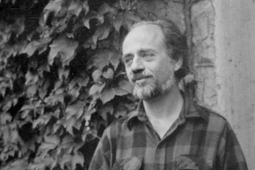Prestigious arts academy will induct Martin Boykan
Entry to American Academy of Arts and Letters is among highest professional honors

Martin Boykan in 1981 at Yaddo, an artists' community in Saratoga Springs, New York
Martin Boykan, who will turn 80 next month, is at the time of life when many people admit to fleeting—or longer—thoughts of their legacies. Few get reassurance of the value of their work at the level Boykan just received.
The emeritus professor of music has been told that he will be inducted into the American Academy of Arts and Letters this May. He will join a number of his colleagues and mentors including Walter Piston, who was elected in 1938, Aaron Copland, who was elected in 1942 and Paul Hindemith in 1947.
Entry into the academy, which was founded in 1898, is considered one of the highest formal recognition of artistic merit in the United States. This 250-member organization of architects, composers, artists and writers are elected for life.
“Many are nominated, few are elected," says Virginia Dajani, executive director of the academy. “The only vacancy that we can have is if one of the members passes away.”
|
|
|
Boykan's Citation —Yehudi Wyner, professor emeritus of composition and Pulitzer Prize winner |
|
|
Boykan says that he was surprised when he learned of the honor as the academy keeps nominations very hidden. “I was very pleased, of course,” he said in an interview. “But I would have to say that at my age, what matters most to me is when performers and listeners of my music really care about it, because then one has communicated something.”
Boykan grew up in New York City and came to Boston at the age of 16. He earned a bachelor or arts degree from Harvard in 1951 and a masters degree in music from Yale in 1953. He spent the next two years in Vienna, as a Fulbright Fellow. He came to Brandeis in 1957 at the invitation of Irving Fine, then chair of Creative Arts Division to organize contemporary music. He also colaborated with Robert Koff, a founding member of the Juilliard String Quartet, and developed the Brandeis Chamber Ensemble.
“When I first came to Brandeis, and for decades after that, this was absolutely the most extraordinary place that one could imagine for a university,” says Boykan. “This is not to say that there were no conflicts and difficulties—that’s life—but it was extraordinary because of the dedication, the quality of students and the quality of the faculty.”
Boykan, who studied with legendary pianist Edward Steuermann, originally was brought to Brandeis as a pianist to teach and play chamber music. As a composer he studied with Aaron Copland, Paul Hindemith and Walter Piston. Three years later Boykan became a member of the composition faculty.
Over the years he taught hundreds of students including composers Steven Mackey, Peter Lieberson, Marjorie Merryman and Ross Bauer.
“It’s probably a lesser known aspect of his career, that he is a fantastic pianist as well as a composer,” says Mark Kagan, senior academic administrator in the Brandeis music department. “He is what I would call a very rigorous contemporary music composer because his music is extremely challenging and brilliant at the highest level.”
Boykan has written for numerous instrumental combinations including chamber music for mixed ensembles, string quartets, various trios, duos and solo works, music for voice and piano as well as instrumental ensembles and choral music. In 2004 he wrote a volume of essays entitled “Silence and Slow Time: Studies in Musical Narrative,” which was published by Scarecrow Press. He recently wrote “The Power of the Moment: Essays on the Western Musical Canon” published by Pendragon Press, 2011.
His awards include a Rockefeller grant, Guggenheim Fellowship, a Fulbright and the Walter Hinrichsen Publication Award from the American Academy and National Institute of Arts and Letters. Boykan's music is recorded by CRI and is available through New World Records or Amazon.com, Albany Records, and Boston Music Orchestra Project. Scores are published by Mobart Music Press, and C.F. Peters, NYC.
“Marty is certainly one of the most deserving composers,” says Eric Chasalow, an Irving Fine Professor of Music. “He’s someone who is devoted to the profession not to a career. He’s probably writing the best stuff he’s ever written now, at [near] 80 years of age.”
Chasalow says that Boykan is considered a guru and a respected teacher but he doesn’t have the flashy career like many people who often get elected to these posts.
“He’s not being commissioned by major orchestras; he writes primarily chamber music,” says Chasalow. “But it’s exquisite chamber music and to see that recognized is extremely gratifying.”
Reflecting on his life and his induction into the academy Boykan laughs and says, “Looking back, I’m very grateful.”
The election, Dajani explains, occurs in two stages. In the first stage only the composers vote for the nominated composers. When a nominee makes the first cut, members of the academy including painters, sculptors and architects vote as well.
“We only had two vacancies in music this year, so the number of people who were nominated was pretty [vast],” she says. “A nomination must have three supporters, and two of the three must be in the department in which the person is being proposed.”
Categories: Arts, General, Humanities and Social Sciences







